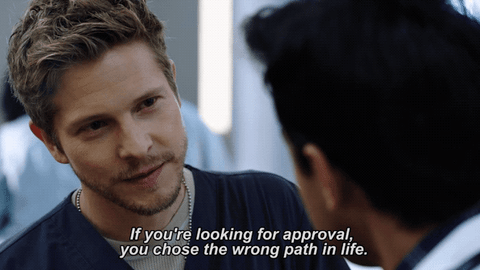
Mindset Tips
New Job Jitters!
Anxiety is a pervasive feeling going into a new job or learning a new skill at work.
A Monster poll says 87% of people report nervousness when they start a job!
It’s important to acknowledge how normal it is to feel new job jitters and not beat yourself up for it. During the lead-up to my first solo shift, I felt unsure and scared. The emotions I experienced are still fresh in my mind, so I have a lot of empathy for those starting soon.
Although these feelings are normal, they can obstruct your ability to do your best if not managed.
Macher et al. (2012) state that increased anxiety may cause an individual to experience low self-efficacy levels and a high fear of failure in learning situations.
Anxiety can also trigger further negative emotions (frustration, anger, fear, etc), which may be very mentally taxing and keep your focus diverted from learning. Especially in the early stages of workplace training, cognitive skills are in high demand to learn the new skill so this lack of concentration can be extremely harmful (Bell & Kozlowski, 2008).
I want you to ask yourself some deceptively simple questions:
How are you feeling at the current moment reading this?
Explore the emotions and the source of them
Are there thoughts or feelings you are avoiding facing?
Is there anything you can do now to ease any of those feelings?
These were some questions I asked myself and journaled (which I highly recommend). I got my scribe position through Scribe America, so when I did the standardized online training and exam, I felt quite confident. It was like any other university course. You study the material, memorize a bunch of terms, and take the test. Right up my alley. But reality started setting in once I started my in-person training at the hospital where I would be working.

Validation
“If you’re looking for approval, you chose the wrong path in life.”
Being a scribe, like most clinical jobs, is not the place to get approval or seek validation. Everyone who works at the hospital is working hard, has their responsibilities, is most likely just as stressed and overwhelmed as you, and has egos that may limit the capacity for empathy they show to you and others.
I’m a firm believer that one of the biggest reasons people feel anxious going into a new job (especially pre-health students) is due to the very high standards they have for how they’re perceived. There’s a big difference between having expectations in how well you perform and expecting yourself to be the “best” at a particular skill.
The former sets target goals to work towards and push yourself to. The latter is dependent on how other people in the same or similar roles are performing and how you measure up to them. This also gets mixed with the desire for those around you to offer up praise, validation, and overall think highly of you.
When you are learning a new skill or starting a new job you should NEVER spend time wondering what others think about you and your skills. Other than the constructive criticism that is naturally a part of the workday, don’t worry or spend time wondering if they think you’re learning too slowly or ask too many questions. What coworkers or managers think of you is not only not your concern, but it is also not helpful to you since it is usually based on subjective interpretation.
When I feel the urge to overthink what a doctor or trainer thinks of my skills, I tell myself, “If there is a significant enough concern they have over my performance, I trust they will bring it to my attention themselves. I will not speculate I’m doing worse than I think I am.”

Strangely enough, I’m reminded of the Bird episode from Victorious (yes, I rewatched it). Tori, the new kid in school, was given a script to perform a short play with a figurine bird. Simple enough, she thought. When she performed it for her class, her teacher gave her surprisingly negative yet vague criticism. To her disappointment, she was instructed to redo the assignment.
The whole assignment was a test for her to stand up for herself and believe her performance was good enough. There’s a lesson here for us as well. It takes some time to build up the confidence to share finished medical charts with the doctor without fearing you made a mistake or it could be better.
Eventually, you need to accept that there is no such thing as a perfect note and you are simply trying your best. You can’t wait for the teacher, trainer, doctor, or boss to tell you “Yup, NOW you’re ready and perfectly mastered this skill.”
You just have to…